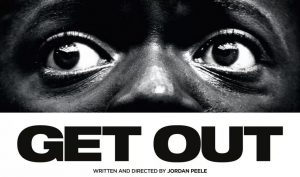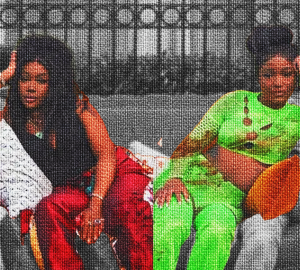The afrofuturism of film signifies a growing movement in the industry
How our students react to the recent success of African American cinema

Although Black History Month has come to an end, the feeling of pride within the black community is still strong. One of the reasons as to why is because of the major success coming from black filmmakers throughout the industry recently. While the 2010s in general have been a notable time of high success for black filmmakers, 2018 has, so far, proven to be especially powerful.
Starting off in January with the announcement of the 90th Academy Award nominations, Jordan Peele’s “Get Out” proved to be a surprising favorite among the Academy members. With nominations for Best Actor, Original Screenplay, Best Director and Best Picture, “Get Out” is a rarity for such high honors within the Academy, not only for being a low-budget release, but also for being a horror film, a genre often disregarded entirely by the Academy. On top of that, Jordan Peele is now the third person in history to be nominated for Best Director, Best Screenplay and Best Picture for a debut film and the first African American to do so.
Then in February, Marvel’s most recent installment “Black Panther” continued to break ground and inspire audiences. With a record-breaking domestic opening weekend of $242 million and a current worldwide gross of $763 million, “Black Panther” has broken multiple box office records, most notably being the highest grossing debut from a black director. The film has also become a notable phenomenon for black communities, with a number of fundraisers being started to bring young people to see the film.
Now, in March, history for black cinema is still being made. Disney’s upcoming live-action, fantasy film “A Wrinkle in Time” is significant for being the highest budgeted film (exceeding $100 million) given to a black female director, Oscar-nominated Ava DuVernay.
Naturally, with things taking such a significant turn, our students are more than excited to be working in an industry. Second-year film student Ivy Bufford said, “As a black filmmaker, I think I’m very fortunate to be entering the industry around this time. I’m rooting for just about everybody black.”
Lydia Fiyori, a second-year film student, said she’s also a fan of the movement because while she’s inspired to tell true storytelling of all people, the lack of such stories can sometimes be unmotivating. “I struggle to persevere when others put my ideas and beliefs down, but seeing those like Jordan Peele and Ava DuVernay really make me feel like my goals and dreams for the art form are achievable,” said Fiyori. “These amazing trail blazers are making it truly a golden time to be a black filmmaker because others are finally starting to realize our stories are not only good, but can sell.”
With the world being as it is, there is still concern of how long this movement will last, especially in the midst of the sexual misconduct plaguing the industry. “There are so many sexual assault claims going around, it makes me concerned being a woman,” said Bufford. “I want to work in the film industry, aid to its success — not be assaulted by it. At the end of the day, my guard is always up as a black woman. And that’s my issue. Racism still exists and so does misogyny. I hope with the increase of black filmmakers these issues decrease.”
Fiyori also expressed concern regarding the movement’s effects. “Because of the way America works, I feel like for every breakthrough there is a backlash,” said Fiyori. “Although right now things seem bright, and I hate to say it, there will most likely be a dry period of African Americans struggling to make a name for themselves in the industry. Things like this will pass I believe. I just hope it doesn’t last long as I continue to progress in my career and make a name for myself.”
Regardless of what happens down the line, there is plenty to still be grateful for in the age we are living in now in terms of media. With creators of various backgrounds finally having the ability to find success in telling their stories, the possibilities for people of all races to find opportunities is greater than ever. And as long as there are people willing to take those opportunities, the future of film is bright.



























